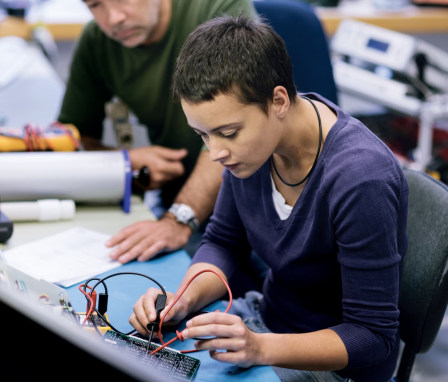Computer engineering creates a bridge between the engineering and computer science disciplines. At the bachelor's level, computer engineering degrees teach you to design and develop computer-based systems using engineering principles.
Part of what can make computer engineering appealing is the field's breadth and applicability. Computer engineering covers hardware and software development and integration, as well as networks and cybersecurity applications. The need for computer engineers' skills increases alongside global demand for better computers that can integrate more seamlessly into daily life.
In this guide, we explore computer engineering degrees in detail, spotlighting what you can expect from programs in this field, where they can take you, and how to choose the best school for your needs. To help you make your decision, we also provide a ranked list of the best computer engineering schools and degrees.
Popular Online Programs
Learn about start dates, transferring credits, availability of financial aid, and more by contacting the universities below.
Best Undergraduate Computer Engineering Degrees
#1 Top Bachelor’s in Computer Engineering Degrees
Ohio State University-Main Campus
- Columbus, OH
- 4 years
- Online + Campus
Based in the state capital of Columbus, Ohio State University's main campus ranks among the largest in the United States. Despite its size, the school has a solid institution-wide student-to-faculty ratio of 19-to-1, and almost 80% of first-year classes have 50 or fewer students.
Offered through the College of Engineering, this acclaimed program maintains a primary focus on computer software. Its applied approach centers on topics with strong current and future commercial potential, including artificial intelligence, algorithms, and data structures. About 75% of students participate in co-op jobs and internships, which are available nationally and internationally.
The curriculum makes a particularly strong match for learners planning to pursue advanced degrees in computer science. Students contribute to research projects operated by senior faculty members within the College of Engineering and other university departments. These experiences look great on CVs, strengthening graduate school and employment applications.
Applying to Ohio State
Applicants must meet entry requirements for both the university and the computer science and engineering major. To qualify for the latter, degree-seekers must complete foundational survey courses in mathematics, computer science and engineering, physics, and English.
Program at a Glance
School Type: Public
Accreditation: HLC, ABET
Tuition: $11,518/year (in state), $33,502/year (out of state)
Required Credits: 126 credits
Program Length: 4 years
Delivery Format: On campus
Percent Online Enrollment
77%
Percentage of all students who are enrolled online.
Accreditation
Yes
Higher Learning Commission
#2 Top Bachelor’s in Computer Engineering Degrees
University of California-Davis
- Davis, CA
- 4 years
- Online + Campus
An affordable college that offers excellent returns on student investment, UC Davis features 102 undergraduate majors and 101 graduate degrees and programs. The school's scenic campus lies within a two-hour drive of major destinations like San Francisco, Napa Valley, and Lake Tahoe.
Divided into lower and upper divisions, this innovative program develops mathematics, physics, and engineering proficiencies before applying them to an advanced set of computer science courses. In upper-division courses, students complete required units in hardware, software, and electronics before selecting a set of technical and design electives that enhance targeted skill sets.
Course content builds a versatile and transferable knowledge base capable of quickly integrating new advancements in this dynamic, rapidly evolving field. Qualified learners can also work toward dual degrees in computer and electrical engineering for access to a broader set of career paths.
Applying to UC Davis
Candidates must meet general admission requirements for UC Davis, then maintain a GPA of at least 3.2 across a set of foundational courses in chemistry, mathematics, engineering, and physics.
Program at a Glance
School Type: Public
Accreditation: WSCUC, ABET
Tuition: $14,597/year (in state), $44,352/year (out of state)
Required Credits: 138-147 credits
Program Length: 4 years
Delivery Format: On campus
Percent Online Enrollment
21%
Percentage of all students who are enrolled online.
Accreditation
Yes
Western Association of Schools and Colleges Senior Colleges and University Commission
#3 Top Bachelor’s in Computer Engineering Degrees
Brigham Young University
This unique Utah-based institution maintains formal ties to the Church of Jesus Christ of Latter-Day Saints (LDS). About 99% of the school's student body identifies as LDS members.
BYU's program emphasizes a rigorous set of core requirements covering 21 computer science courses. Students proceed into specialized electives in their upper years, supplementing their foundational knowledge in targeted areas such as artificial intelligence and machine learning, algorithms, software design and engineering, and hardware design.
Learners emerge with extensive problem-solving and design proficiencies, and the program also develops important soft skills including collaboration, communication, and ethics. The BYU approach to pedagogy also builds in lifelong learning, helping graduates quickly adapt to the technological advancements that occur as they move through their careers.
Applying to BYU
BYU's application process requests that applicants submit all relevant academic transcripts along with ACT/SAT scores and English proficiency test scores, if necessary. Learners must also agree to abide by the school's LDS-inspired honor code.
Program at a Glance
School Type: Private
Accreditation: NWCCU, ABET
Tuition: $2,985/semester (full time, LDS), $5,970/semester (full time, non-LDS); $315/credit (part time, LDS), $630/credit (part time, non-LDS)
Required Credits: 120 credits
Program Length: 4 years
Delivery Format: On campus or hybrid
Percent Online Enrollment
37%
Percentage of all students who are enrolled online.
Accreditation
Yes
Northwest Commission on Colleges and Universities
#4 Top Bachelor’s in Computer Engineering Degrees
University of Notre Dame
- Notre Dame, IN
- 4 years
- Online + Campus
Famed home of the Fighting Irish and rooted in its founding Catholic traditions, the University of Notre Dame boasts an impressive list of alumni including such luminaries as Regis Philbin, Condoleezza Rice, Joe Theismann, and Joe Montana.
Open to applicants with no previous programming experience, ND offers bachelor's degrees in both computer science and computer engineering. The latter specialization maintains a stronger emphasis on hardware design and architecture, and students apply gained proficiencies in hands-on laboratory settings.
Notably, computer engineering students qualify for ND's biannual career expos, held in the fall and spring semesters. Learners can also participate in the school's Silicon Valley Program, which matches computer engineering students with emerging startups in Northern California's tech hub. These features mark a major reason why ND's computer science and engineering graduates enjoy placement rates at or close to 100%.
Applying to ND
Admissions officials evaluate each candidate's application on an individual basis. Priority criteria include academic performance, extracurricular activities, letters of recommendation, and a personal essay. The school has a test-optional policy until at least 2023.
Program at a Glance
School Type: Private
Accreditation: HLC, ABET
Tuition: $58,843/year
Required Credits: 132 credits
Program Length: 4 years
Delivery Format: On campus
Percent Online Enrollment
4%
Percentage of all students who are enrolled online.
Accreditation
Yes
Higher Learning Commission
#5 Top Bachelor’s in Computer Engineering Degrees
California Polytechnic State University-San Luis Obispo
- San Luis Obispo, CA
- 2 years
- Online + Campus
Based in the scenic Central Coast city of San Luis Obispo, Cal Poly consistently ranks among California's leading technical education institutions. The school's storied history dates to 1901, with a statue of Albert Einstein traditionally granting good luck to students who rub his head before taking an exam.
This intensive, rigorous program offers a dynamic, hands-on combination of theory and practice. Degree-seekers enjoy access to seven cutting-edge labs, including the Cisco Advanced Networks Lab and the Human-Computer Interaction Lab. These facilities advance the school's pedagogical philosophy to "learn by doing," and the institution's proximity to Silicon Valley creates a valuable job pipeline.
Learners can apply their 12 required technical elective units to a specialization, with current options covering computer architecture, computer controls, networking, very-large-scale integration, embedded systems, graphics and multimedia, robotics, and software. The curriculum also transfers to several blended programs, which combine the BS with MS degrees in biomedical engineering, computer science, and electrical engineering.
Applying to Cal Poly
Admission to Cal Poly is competitive, and the school remains highly selective. Candidates must meet general California State University requirements in addition to institution-specific criteria, which evaluate academic performance, extracurriculars, and subjective indicators.
Program at a Glance
School Type: Public
Accreditation: WSCUC, ABET
Tuition: $10,194/year (in state), $28,104/year (out of state), $30,420/year (international)
Required Credits: 191-195 credits
Program Length: 4 years
Delivery Format: On campus
Percent Online Enrollment
74%
Percentage of all students who are enrolled online.
Accreditation
Yes
Western Association of Schools and Colleges Senior Colleges and University Commission
#6 Top Bachelor’s in Computer Engineering Degrees
Northeastern University
- Boston, MA
- 4 years
- Online + Campus
Based in Boston with 10 satellite campuses in the United States and international locations, Northeastern emphasizes experiential learning. The school counts more than 19,000 undergraduates among its diverse student body.
This blended program combines dedicated modules in engineering and computer science to equip tech-literate learners with advanced computational thinking and design capabilities. Over the program's extended five-year course, learners participate in a trio of co-ops that enrich their classroom learning with field experience and networking opportunities.
Many computer engineering programs feature a primary or exclusive focus on hardware, but Northeastern offers a balanced approach that builds equal familiarity with hardware and software. As a result of the program's unique structure and interdisciplinary focus, graduates emerge prepared for an expanded set of career options.
Applying to Northeastern
Core application materials include academic transcripts, a counselor recommendation and teacher evaluation, and an institutional application. Test scores remain optional for the 2021-22 academic year.
Program at a Glance
School Type: Private
Accreditation: NECHE, ABET
Tuition: $27,180/term
Required Credits: 139 credits
Program Length: 4-5 years
Delivery Format: On campus
Percent Online Enrollment
33%
Percentage of all students who are enrolled online.
Accreditation
Yes
New England Commission on Higher Education
#7 Top Bachelor’s in Computer Engineering Degrees
University of Florida
- Gainesville, FL
- 4 years
- Online + Campus
Located in Gainesville, the University of Florida is a high-profile research university with a history spanning more than 160 years. Its fall 2020 first-year students boasted average GPAs of 4.5 and SAT scores of 1405, indicating high institutional levels of academic excellence.
UF's well-regarded bachelor's degree in computer engineering combines courses offered through the Department of Electrical and Computer Engineering and the Department of Computer and Information Science. This multidisciplinary focus supports an extended list of specialization options, including cybersecurity, machine learning and artificial intelligence, systems engineering, hardware engineering, and computer architecture.
The program builds to an intensive culminating experience, in which candidates undertake a major project in computer design and present their work to a faculty panel. This requirement speaks to the program's objective of developing well-rounded, capable professionals with complete hard and soft skill sets.
Applying to UF
Candidates who qualify for UF admission must also complete a set of eight pre-professional courses in advanced mathematics and physical sciences. Applicants must maintain at least a 2.5 GPA across their first two pass attempts to qualify for full admission.
Program at a Glance
School Type: Public
Accreditation: SACSCOC, ABET
Tuition: $6,380/year (in state), $28,658/year (out of state)
Required Credits: 126 credits
Program Length: 4 years
Delivery Format: On campus, hybrid
Percent Online Enrollment
57%
Percentage of all students who are enrolled online.
Accreditation
Yes
Southern Association of Colleges and Schools Commission on Colleges
#8 Top Bachelor’s in Computer Engineering Degrees
Bucknell University
- Lewisburg, PA
- 2 years
- Campus
Founded in 1846, this small but accomplished liberal arts university has an impressive institution-wide student-to-faculty ratio of 9-to-1. Its class of 2019 had a 95% placement rate, including average starting salaries of more than $60,000 per year.
This innovative, skills-focused computer engineering degree features a thorough and balanced curriculum purpose-built to yield graduates who adapt quickly to the field's fast-changing nature. Endorsed by ABET, the program moves beyond technical skills to integrate ethical and social considerations.
Bucknell also offers a BS in electrical engineering, and the first two years of the computer and electrical engineering programs mirror each other. Students thus have latitude to move between the two, with computer engineering majors enjoying unique access to a cutting-edge concentration in the internet of things.
Applying to Bucknell
Candidates must apply to Bucknell's College of Engineering. Applicants must have at least three years of college prep courses in mathematics and at least one year of chemistry or physics. They must also submit questions for the school along with a personal essay, a teacher recommendation, a guidance counselor evaluation, and academic transcripts.
Program at a Glance
School Type: Private
Accreditation: MSCHE, ABET
Tuition: $59,474/year
Required Credits: 34 major credits
Program Length: 4 years
Delivery Format: On campus
Percent Online Enrollment
Not provided
Accreditation
Yes
Middle States Commission on Higher Education
#9 Top Bachelor’s in Computer Engineering Degrees
Villanova University
- Villanova, PA
- 4 years
- Online + Campus
As the only Augustinian Catholic institution of higher learning in the United States, Villanova emphasizes personalized, global-minded learning. This Pennsylvania-based school is also notable as the home of the Wildcats, winners of multiple NCAA Division I men's college basketball titles.
Villanova's computer engineering program develops skills in seven core areas: C and C++ programming languages, algorithms, hardware and computer architecture, networking, interfacing, system design, and microprocessor systems. Students may then specialize in their upper years. Concentration options include cybersecurity, microcontrollers, multimedia, real-time digital signal processing, and software engineering.
The program culminates with an intensive three-semester capstone project. Industry partners often participate in student research, delivering outstanding networking and resume-building opportunities. For added depth, learners can also minor in cybersecurity, electrical engineering, or mechatronics, or pursue a double major in electrical and computer engineering.
Applying to Villanova
Core application requirements include an institutional application, high school academic report and transcripts, a guidance counselor and teacher recommendation, a mid-year report, and a personal essay. ACT/SAT scores are optional.
Program at a Glance
School Type: Private
Accreditation: MSCHE, ABET
Tuition: $29,145/semester
Required Credits: 133 credits
Program Length: 4 years (4.5 years for a dual degree in electrical and computer engineering)
Delivery Format: On campus
Percent Online Enrollment
26%
Percentage of all students who are enrolled online.
Accreditation
Yes
Middle States Commission on Higher Education
#10 Top Bachelor’s in Computer Engineering Degrees
Virginia Polytechnic Institute and State University
- Blacksburg, VA
- 4 years
- Online + Campus
As a comprehensive research university, Virginia Tech prioritizes experiential approaches to learning and maintains a strong focus on undergraduate education. The school ranks in the top 5% of the U.S. for its research spending, which totaled more than $531 million as of spring 2021.
Offered through the Bradley Department of Electrical and Computer Engineering, Virginia Tech's program concentrates on computer programming, physics, and mathematics in its deep exploration of technical concepts. Students engage with a learn-by-doing approach, which includes extensive experiential and practical learning opportunities with leading companies and research organizations.
Specific topics of study include very-large-scale integration, artificial intelligence and machine learning, networking, real-time systems, embedded systems, and other cutting-edge areas. Learners proceed into the computer engineering program after completing a first-year sequence of engineering courses, which provide a common academic foundation for all Virginia Tech engineering majors.
Applying to Virginia Tech
Candidates gain entry to the program by applying after completing one year of general engineering studies. Admission to Virginia Tech is competitive, with the 2019 class of incoming engineering undergraduates reporting average high school GPAs of 4.14 and SAT averages of 1351.
Program at a Glance
School Type: Public
Accreditation: SACSCOC, ABET
Tuition: $13,691/year (in state), $32,835/year (out of state)
Required Credits: 131 credits
Program Length: 4 years
Delivery Format: On campus
Percent Online Enrollment
57%
Percentage of all students who are enrolled online.
Accreditation
Yes
Southern Association of Colleges and Schools Commission on Colleges
How We Rank Colleges And Bootcamps
ComputerScience.org ranks computer science degree programs at the associate, bachelor’s, master’s, and doctoral levels. We also rank bootcamps and certificate programs. Our top priority is making sure you find the best possible fit for your education. We use up-to-date national statistics and focus on factors like return on investment, academic quality, and affordability.
This ranking is from 2023. Learn how we created this list on our rankings methodology page.
Why Get a Bachelor's Computer Engineering?
Computer engineering began with the development of the first electronic digital computers in the early 20th century. Until about 1971, when Case Western Reserve University opened the first accredited computer engineering program, the discipline was an electrical engineering specialization.
According to the U.S. Bureau of Labor Statistics (BLS), the nation's computer hardware engineering workforce consists of over 78,000 professionals who design and develop computer systems and components. These engineers work in many industries, including research and development, computer design, electronic device and computer manufacturing, and government agencies.
Compared to computer science, which focuses on computer theory and the analytical applications of computers, computer engineering emphasizes hardware development. However, you can still put your technological, problem-solving, and critical thinking skills to work in a software engineering capacity. In fact, the high demand for software innovation within existing computer hardware makes this subfield a logical pursuit for many computer engineers.
It's largely because of computer engineers that technology has become so integrated in our lives. With a computer engineering degree, you can enjoy benefits such as:
-
Career Flexibility: Computer engineers can apply their computer and design expertise to multiple subfields, including software engineering, computer systems analysis, and computer network architecture.
-
Job Outlook: The BLS projects 5% growth in computer engineering occupations between 2022 and 2032, faster than the 3% average growth rate for all occupations.
-
High Earnings: With a median annual salary of $138,080, computer engineers make some of the highest wages among computer professionals. The top 10% of earners bring in more than $212,770.
What to Expect From Computer Engineering Programs
While computer hardware design and development remains the main focus of most computer engineering programs, computer engineering schools incorporate other technology elements into their curricula as well, including software development, cybersecurity, and robot design. Depending on your program, you may also study networks, electronics, video games, programming, and circuitry.
Computer engineering degrees typically require 120 credits and take about four years of full-time study. In addition to coursework, computer engineering programs often conclude with an applied design project where you synthesize the skills you've learned. The majority of these programs lead to a BS degree.
Many of the best computer engineering programs hold optional programmatic accreditation from agencies like ABET.
Admission Requirements
Every computer engineering school has its own admission process and requirements, but many institutions require materials like:
- High school diploma or GED certificate
- Recommendation letters
- Minimum GPA
- Standardized tests
- Prerequisite courses in science and math
- Application fee
You can apply to many computer engineering schools using the Common App, a tool that streamlines the application process and helps you send and monitor applications to multiple schools at once.
Degree Options
While the majority of computer engineering schools award BS degrees, you may encounter programs that culminate in BA or a bachelor of engineering (B.Eng.) degrees. These less common designations can reflect a different curricular focus. For example, BS degrees usually emphasize math and science, BA degrees typically require more interdisciplinary coursework, and B.Eng. degrees often have a practical focus.
Instead of a computer engineering degree, you can also pursue a general engineering degree with a cross-disciplinary specialization, such as a B.Eng. with a specialization in computer science.
Popular Courses
The courses you take depend on your computer engineering degree type, school, and program, but the following list highlights some of the more common classes you may encounter.
- Computer Architecture: In this course, students learn the primary techniques for building computer systems and devices. The class explores the design process from beginning to end, considering concepts like performance and hardware/software interaction across design stages.
- Computer Communication Networks: This course covers the process for analyzing network performance, including designing and developing efficiency improvements. Enrollees learn how factors like user access, congestion, and routing protocols impact network performance.
- Circuit Analysis: In this class, students learn about analyzing circuits through methods like node voltage and mesh current. Learners also study circuit laws, power transfers, and voltage determinations.
- Embedded Systems Design: This course teaches enrollees the techniques and methodologies for designing embedded systems and applications. The course may also cover topics in real-time operating systems and systems on programmable chip technology.
Are Computer Engineering Schools Expensive?
Though colleges and universities are expensive in general, computer engineering programs typically charge similar tuition to other bachelor's degrees. According to data from the National Center for Education Statistics for the 2022-23 school year, in-state students at four-year public schools paid an average tuition of $9,750. Out-of-state enrollees at public institutions paid $28,297, and learners at private schools paid $35,248.
Other costs to consider include room and board, course materials, and travel. Online programs can save you money in some areas, including in-state or reduced tuition rates for distance education learners at some schools.
No matter what your costs or your situation, consider applying for financial aid to help you pay for your degree. Completing your FAFSA each year can help you qualify for federal loans and grants. You may also need a completed FAFSA to apply for national, state, and institutional scholarships.
Jobs for Bachelor's in Computer Engineering Graduates
A computer engineering degree can prepare you for roles in many technology subfields, including jobs like computer systems analyst, network architect, and other computer science careers. With experience, professional certifications, and advanced degrees, you can even rise through the ranks into leadership and executive positions. We explore several of these careers below.
Computer Hardware Engineer: Computer hardware engineers design and build computer systems, components, and devices. They research technological problems and design solutions and improvements that address these issues. They may also oversee steps in the manufacturing process. These engineers often work in research and development, semiconductor manufacturing, and computer systems design.
- 2023 Median Annual Salary: $138,080
- Job Outlook (2022-32): +5%
Information Security Analyst: Information security analysts work with organizations to bolster their cybersecurity practices and technologies. Their duties may include monitoring systems for threats, identifying vulnerabilities, and updating or implementing new security protocols. These professionals can find work in many industries, but the largest employers include the computer systems design, finance and insurance, and information sectors.
- 2023 Median Annual Salary: $120,360
- Job Outlook (2022-32): +32%
Software Engineers: Software engineers oversee the design and development of software solutions that address organizational and user needs. They work with developers and programmers to write and test code. Software engineers primarily work in industries like computer systems design, software publishing, and finance and insurance.
- 2023 Median Annual Salary: $130,160
- Job Outlook (2022-32): +25%
Choosing the Right School for Computer Engineering
The right computer engineering school for you is the one that best aligns with your unique learning needs and future goals. Some considerations are more universal, such as institutional accreditation, a process schools must undergo before they can offer federal financial aid.
Here are some other factors to consider:
- Program Curriculum: Look for a computer engineering program that covers the topics that interest you most. Search for specializations in the field that you want to work in, such as hardware, software, artificial intelligence, biomedical engineering, or information security systems.
- Program Location and Format: Online learning may allow you to pursue a computer engineering degree without relocating, but check schools' residency requirements before jumping in. You may need to attend orientations, campus residencies, or some classes in person, which may be difficult if your program is far away.
- University Resources: Your school's resources and support channels can make a big difference in your educational experience and your postgraduate opportunities. Research each prospective institution's offerings for career services, academic support, and facilities.
- Cost and Financial Aid: When comparing program costs, be sure to research financial aid opportunities. Funding options like grants and scholarships can make programs more affordable.
Should You Get Your Degree Online?
Online learning can help you fit your studies around your schedule and reduce your travel requirements, but it may not provide you with the educational experience you need.
Online courses typically run in two formats: asynchronous and synchronous. Asynchronous delivery allows you to study anytime and anywhere, but it can feel less engaging and requires self-sufficiency. Synchronous delivery better simulates the traditional classroom environment, but it requires you attend class during specific hours, which may include evening or weekend meetings.
If you value an interactive classroom experience over flexibility, you might consider an on-campus program or a hybrid program that combines online and on-campus classes.
More Computer Engineering Degree Programs

Computer Engineering Certificate Programs

Associate Degrees in Computer Engineering

Master's Degrees in Computer Engineering

Doctoral Degrees in Computer Engineering
Questions About Computer Engineering Degrees
What can you do with a bachelor's degree in computer engineering?
With a bachelor's in computer engineering, you can pursue entry-level careers in fields like computer engineering, software engineering, network architecture, and computer systems analysis. You can also continue your education with a master's degree in engineering or computer science.
Is a bachelor's in computer engineering worth it?
A bachelor's in computer engineering can help you qualify for careers that pay higher-than-average wages, giving these degrees a positive return on investment. The skills you build in these programs can also lay the foundation for graduate studies and professional certifications in several disciplines.
Does computer engineering require a lot of math?
Computer engineering programs do require math classes such as calculus, linear algebra, and probability. Though math is not the most central element of a computer engineering degree, you still need a functional understanding of math to be successful in this field.
Are computer engineering schools hard to get into?
Some computer engineering schools feature less stringent admission requirements, but the most competitive schools and programs may require minimum GPAs and standardized test scores. In many cases, the more prestigious a school is, the more selective their admissions process is.
The insights on this page — excluding school descriptions — were reviewed by an independent third party compensated for their time by ComputerScience.org. Page last reviewed June 20.

 Edited by
Edited by




